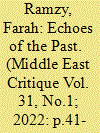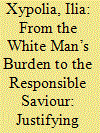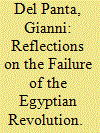|
|
|
Sort Order |
|
|
|
Items / Page
|
|
|
|
|
|
|
| Srl | Item |
| 1 |
ID:
183764


|
|
|
|
|
| Summary/Abstract |
Based on an extensive ethnographic field study among various groups of student activists, this article questions how the memory of historical student protests, namely of 1946 and 1972, is being actualized during student mobilizations after the revolution, especially in the post-2013 repressive context. Focusing on contentious repertoires as the incarnation of memory politics, this article shows how the historical student movement stands for a pool of contentious performances as well as a long standing mnemonic frame of the ‘role’ students should play in society. It then suggests that this past is read through the lens of the ongoing revolution of 2011, and later of the impeding repression. At the same time, the past also weighs in the process of understanding, dealing with and defining one’s place in the present moment whether in terms of actors’ strategies, priorities, ambitions or survival tactics in times of repression. Finally, this article concludes with a preliminary reflection on the potential channels transferring the memory of the student movement, namely, the revolutionary moment, the pre-revolutionary contentious mobilizations, the ‘national historiography’ and Social Media.
|
|
|
|
|
|
|
|
|
|
|
|
|
|
|
|
| 2 |
ID:
183762


|
|
|
|
|
| Summary/Abstract |
In recent years, there has been renewed interest in conceptualising the political nature of human rights as well as intense debate over the precise nature of Western biases in the whole project. Spurred by the fresh renewal of radical theory, a growing body of literature explores the role that racialized power hierarchies have played in the human rights project through the Responsibility to Protect Doctrine. Drawing from critical human rights scholarship, this article explores the way human rights have been employed as a legitimising discourse for justifying military intervention in Libya. In doing so, it illustrates the Eurocentric conceptualisation of power, power hierarchies and subjectivities.
|
|
|
|
|
|
|
|
|
|
|
|
|
|
|
|
| 3 |
ID:
183766


|
|
|
|
|
| Summary/Abstract |
A century ago, W.E.B. Du Bois coined the term ‘double consciousness’ to describe an individual with an identity with several facets, particularly in the context of African-American experiences. A century later, Du Bois’ theory was expanded into a concept called ‘triple consciousness’ to acknowledge the intersectional construction of identities where race might have intersected with ethnicity, gender, sexual orientation, etc. to generate complex, multivalent forms of subordination. Expanding Du Bois’ concept of ‘double consciousness’ to Chicana experiences, and disrupting nationalist Anglocentrism, in Borderlands/La Frontera, Gloria Anzaldúa theorized the ‘border’ as a metaphor for geographical transgressions, sexual boundary crossings, social displacements, and linguistic and cultural dislocations. In conversation with these theorists, I examine Iranian Armenian ‘multiple consciousnesses’, by highlighting their various expressions of diaspora, their many ways of longing to return to a homeland (Armenia and Iran), and their multiple collective consciousnesses, particularly the shared memories of the 1915 genocide. I also provide examples from cultural productions which demonstrate the diasporic transnationalism of Iranian Armenian authors who maintain ties with their homeland while are simultaneously anchored and settled in their host nations.
|
|
|
|
|
|
|
|
|
|
|
|
|
|
|
|
| 4 |
ID:
183763


|
|
|
|
|
| Summary/Abstract |
Between January 2011 and July 2013, Egypt underwent a revolutionary period. While the roots and sequences of the Egyptian revolution have been studied comprehensively, much less has been said about the reasons behind the revolution’s defeat. The reason is twofold. On the one hand, scholars prevalently have explored democratization’s failure. On the other hand, the way in which Egyptian events were understood logically prevented the possibility of analyzing the 2011–2013 situation as an example of a failed revolution. By showing that the emergence of democracy was the most unlikely outcome and adopting an inter-social approach, the present article deals with the failure of social revolution in Egypt. In particular, it argues that the interaction between worldwide ideologies, epochal intellectual currents and (supposedly) successful contemporary revolutions on the one hand, and an internal context shaped by the legacies of Nasserism, the peculiar fate of the communist left and the institutional environment on the other, negatively affected the capacity of the subaltern classes even to outline an alternative political system. The non-emergence of popular bodies rendered unlikely the collapse of state apparatuses, making it impossible for revolutionaries to take power by extra-constitutional means and determining the defeat of the revolution
|
|
|
|
|
|
|
|
|
|
|
|
|
|
|
|
| 5 |
ID:
183765


|
|
|
|
|
| Summary/Abstract |
The IMF discourse on women’s unemployment in Egypt mostly has focused on infrastructural issues as a key barrier to women’s access to the job market. The scarcity of public nurseries and the unavailability of safe transportation are especially challenging. Our interviews confirmed that these two issues are of utmost importance to women. Nevertheless, we argue that there has been no to little focus on the deeper structural issues concerning the productive side of the economy and its relation to women employment, especially the impact of production changes on women in the aftermath of the 2016 Economic Reform Program (ERP).
|
|
|
|
|
|
|
|
|
|
|
|
|
|
|
|
|
|
|
|
|